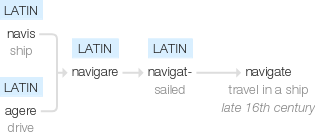Navigate
late 16th century (in the sense ‘travel in a ship’): from Latin navigat- ‘sailed’, from the verb navigare, from navis ‘ship’ + agere ‘drive’.
wiktionary
From Middle English navigate, from Latin nāvigō, from nāvis(“ship”) + agō(“do”), from Proto-Indo-European *néh₂us(“boat”).
etymonline
navigate (v.)
1580s, "move from place to place in a ship, sail" (intrans.), a back-formation from navigation, or else from Latin navigatus, past-participle of navigare "to sail, sail over, go by sea, steer a ship," from navis "ship" (from PIE root *nau- "boat") + root of agere "to set in motion, drive, drive forward" (from PIE root *ag- "to drive, draw out or forth, move"). Transitive sense of "to pass over in a ship or ships, sail on" is from 1640s; that of "to steer, direct, or manage in sailing" is from 1660s. Extended to balloons (1784) and later to aircraft (1901). Related: Navigated; navigating.
